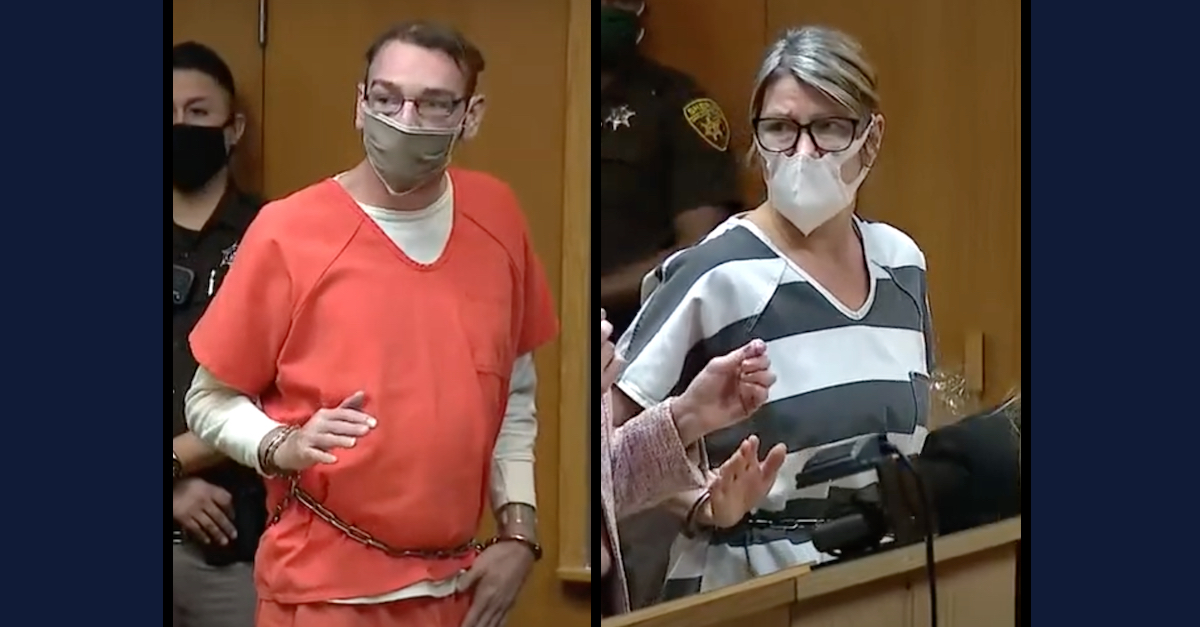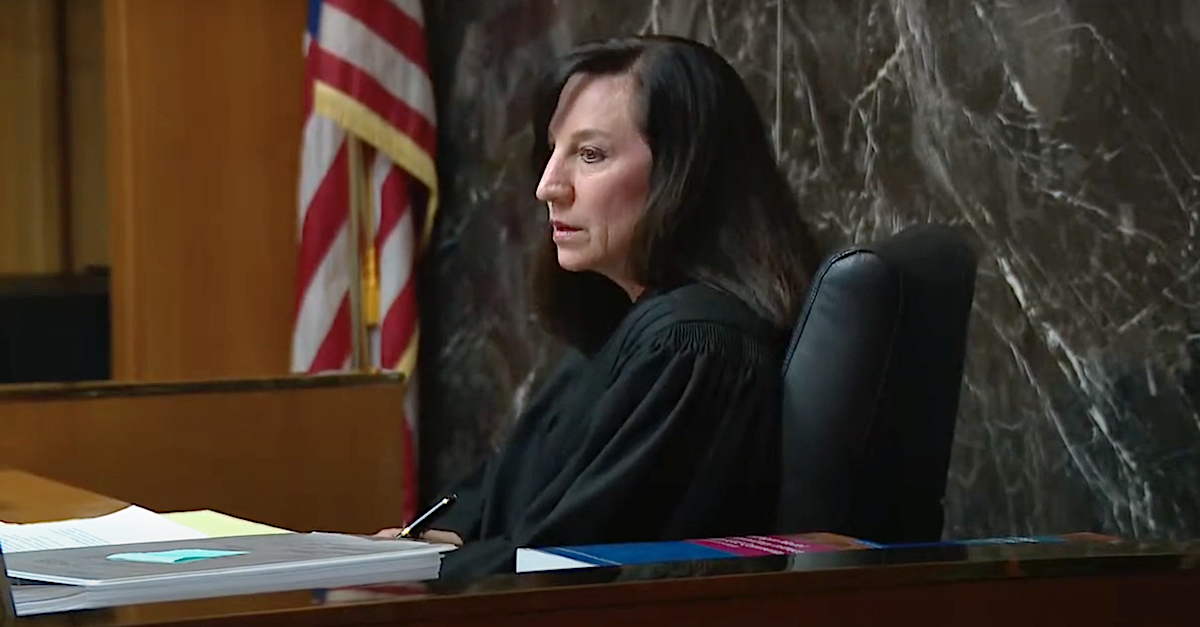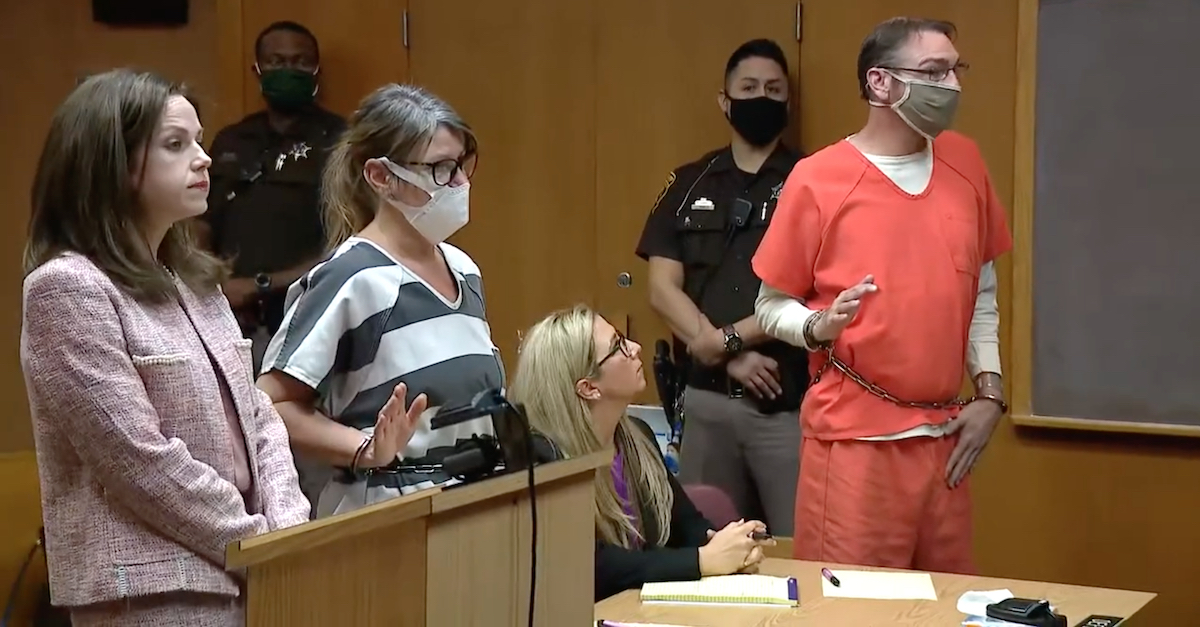
James and Jennifer Crumbley appeared in court together on Tuesday, April 19, 2022. (Image via screengrab from WJBK-TV.)
A judge on Tuesday refused to lower bail amounts for James Crumbley and Jennifer Crumbley, the parents of alleged Oxford, Mich. high school shooter Ethan Crumbley.
Oakland County Circuit Court Judge Cheryl A. Matthews said that while a lower district court judge found probable cause to move forward with the cases against the parents, she (Matthews) believed the “probability of a conviction in this matter is too difficult to gauge or predict.”
Still, the judge said the seriousness of the matter and the defendants’ lack of ties to Michigan were among the reasons the couple should not be given an easier chance to get out of jail before trial. Specifically, the Crumbleys have family in Florida, Judge Matthews indicated. She further noted that the defendants felt unsafe in their home and felt hounded by the press before they were arrested — all the more reason why the judge believed the couple could pose a flight risk.
Judge Matthews also accused the defendants of having an “alternative view” of the facts of their arrest. Though the defense has long scolded law enforcement for not agreeing to allow the Crumbleys to turn themselves in on their own volition, Judge Matthews noted that the parents disappeared for a time and then went on the run — though they didn’t make it any farther than a building near downtown Detroit.
“The serious actions of the defendants and the resulting manhunt supports the prosecution’s proposition that the defendants were fleeing the jurisdiction,” Judge Matthews said — all while asserting that the “primary purpose” of bond was to “ensure the defendants’ appearance.”
“The defendants’ own actions leading up to their arrest make the current bond appropriate,” the judge ruled.

Jennifer Crumbley, Ethan Crumbley, and James Crumbley appear in mugshots taken by the jail in Oakland County, Mich., in Dec. 2021.
The judge, therefore, left bail at $500,000 for each of the two parents. They would need to pony up a million dollars total if they expect to walk free pending trial.
The defense moved to stay the bond decision; the judge declined to do so. That request, the defense said, was a mandatory prerequisite to the filing of an interlocutory appeal on the issue of bond — which the defense said it would soon file.
A trial date was set for Oct. 24, 2022. The defense said it anticipated the penning of 10 separate motions before then. One, the defense said, would be a motion for a change of venue. The defense said it would work on the motions in turn so as not to deluge the court with 10 documents at once.
Prosecutors said they wanted a speedy trial in the matter.

Oakland County Circuit Court Judge Cheryl Matthews speaks to attorneys during an April 19, 2022 hearing. (Image via screengrab from WJBK-TV/YouTube.)
As has been the case with past hearings, significant portions of the pretrial hearing on Tuesday revolved around whether the husband and wife could be represented by attorneys from the same law firm. The Crumbley parents have long waived the negative ramifications and repercussions which may result from the joint representation — all despite skepticism from the court and at times from prosecutors.
The duo again affirmed before Judge Matthews that they agreed to waive any concomitant conflicts.
READ RELATED: Multiple People Shot In Brooklyn Subway Station: 16 injured, including 8 shot, in Brooklyn subway shooting, FDNY says
“Joint representation can compel a lawyer to refrain from taking certain courses of action during a trial, before a trial, and even after trial at sentencing,” the judge said. “Joint representation can affect advice regarding the decision to plead, plea negotiations themselves, and decisions during jury selection.”
The judge elucidated:
Because a lawyer would have the duty of loyalty to both clients, the lawyer may not be able to adjust or take courses of actions that would benefit one client or hurt the other. The duty of loyalty can prevent counsel from pointing out the differences between the clients’ culpability at potential plea negotiations or at sentencing, or making comparisons between two clients that put one client at a disadvantage . . . . The duty of loyalty to both clients can affect counsel’s decisions regarding matters of trial strategy. For example, it could limit the presentation of evidence, the examination of witnesses, or even decisions to call certain witnesses in an effort to protect the other client. As such, in the examination of witnesses, counsel may not be able to ask a question that would help one client but hurt the other. The duty of loyalty to both clients could also prevent counsel from pointing out the differences between the evidence against them or from objecting to the admission of certain evidence as to one client. That is, arguing that certain evidence does not apply to one client can highlight its impact as to the other client. Being duty bound to protect the interests of the other client can prevent counsel from presenting a defense that implicates the other client
After asking if both of the Crumbleys understood the concerns, the judge continued.
There may be situations where counsel cannot effectively assist one client due to the necessity to protect the other. For example, if your codefendant chooses to testify, your attorney may not be able to cross examine them on any testimony that may implicate you or challenge your codefendant’s credibility.
The judge asked the Crumbleys if they adequately discussed the possibility of conflicts with independently appointed attorneys assembled at the behest of the court. The couple had so done and agreed to continue with the joint representation. The judge then warned the couple that the defense attorneys would not be able to serve as witnesses and that the waiver banned the couple from raising the conflict issues on appeal — if they are convicted.
Bailiffs released the defendants’ hands from their handcuffs so that they could sign the necessary waiver paperwork.

James and Jennifer Crumbley appeared in court together with their attorneys on Tuesday, April 19, 2022. (Image via screengrab from WJBK-TV.)
Toward the end of the hearing, defense attorney Mariell Lehman asked the judge to order the jail to move James Crumbley to a new cell block. The request was premised on the “constant monitoring” to which Mr. Crumbley was submitted and issues created by the lights being left on for a full 24 hours each day. Many of the inmates on the block have “significant mental health” issues, Lehman also said.
The judge said she would want the motion made in writing but that, generally speaking, the “separation of powers” made it hard for her to order the jail to provide a specific type of housing.
James and Jennifer Crumbley are charged with four counts each of involuntary manslaughter.
Their 15-year-old son Ethan Crumbley is charged with four counts of first-degree premeditated murder, seven counts of assault, and 12 weapons offenses in connection with a deadly attack that killed Hana St. Juliana, 14, Tate Myre, 16, Madisyn Baldwin, 17, and Justin Shilling, 17. Ethan Crumbley is also charged with terrorism.
Watch the Tuesday hearing below:
[embedded content]
Have a tip we should know? [email protected]
Source:





